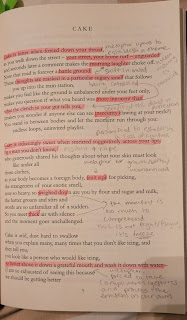Cake, Balloons, and the Importance of Representation
Growing up in a mixed-culture home, I got a bit confused from time to time. Let me paint the picture for you:
In the Serbian language, the name for grandma is baba, so I would always call my grandma on my dad's side my baba and my grandma on my mom's side my grandma. I think my parents figured it was an easy way for a young child's mind to distinguish between the two people, but what they didn't realize was that I grew to believe that everyone applied the same exact labels to their grandparents. So I would saunter around the playground during recess asking a bunch of 7-year-olds who their baba is, and you can pretty much imagine the confused looks I got in return.
Still to this day, I find myself constantly needing to explain elements of culture to my closest friends and sometimes, yes, even my family (my mom's American side). I should probably clarify that I don't mind this AT ALL and love to share my culture with whoever is wanting to listen and learn, but from time to time, I can't help but wonder what my life would be like if I grew up in a community where I didn't need to explain my ethnic foods, harsh ancestral history, or complicated last name. So you can imagine my excitement when I was researching a mentor poet for English class, and a familiar last name popped up.
Monika Radojevic (don't worry, we can walk through this together...RA-DOUGH-YAY-VEECH) is the daughter of a Brazilian mother and Montenegrin father, and she grew up in London. Much of her poetry, at least the poems I have read, focus heavily around exploring her life and what it means to be a woman in the twenty-first century. Radojevic's inspiration for writing poetry is in part to speak about violence against women and why we must be more intolerant toward that concept. She explained in an article with Huck that "If there's one thing I want people to walk away from after reading this book, it's that it's not safe to a be a woman anywhere."
Okay, okay. Allow me to explain why this is a HUGE reason I chose this poet. I know it can seem that all poetry advocating for social change is depressing (if you aren't familiar with this, I highly recommend attending a local speech tournament and watching the poetry competition...it's amazing but will almost certainly make you cry), but with a quick understanding of Radojevic's and my Eastern European side, you can hopefully get a picture as to why her work is so meaningful.
Serbia and Montenegro are right next to each other if you can spot them!
Truth be told, I love my culture and all the wonderful people that are a part of it, but I will also always be the first to point out issues within it. Feminism, for one, is not a popular concept. So seeing not just a woman so eloquently expressing feminist-related issues, but having a woman from my culture to look up to and to serve as a reminder that it's okay to criticize social issues without feeling like I'm betraying my Serbian side has been the therapeutic experience of 2023 that I didn't know I needed. But I'm not complaining.
Today, I'd like to share with you my favorite poem by Radojevic. I think the theme is fairly universal -- impact is more important than intent when someone does not consent to having something done to them, but is so rarely recognized when the action is socially accepted. The example that Radojevic uses? Catcalling and assault.
Annotations (including poetic devices) of "Cake" by Monika Radojevic
Now I'm going to advise everyone to stop reading!!! I love poetry, but I absolutely HATE writing it and I don't think that this is very good, especially because of my passion for hating to write it. But if you want to torture yourself, then I guess you can read it...masochist.
Balloons are fun,
An emblem of the majority of childhoods.
But my balloon is deflating.
With the days that my hair goes unwashed
And the shrinking of each hair follicle
As I tell myself,
Just one more day
Wash it tomorrow
Let yourself sleep those extra twenty minutes.
Balloons are fun,
But mine is deflating.
Or perhaps, trying to?
Is that the right way to put it?
My heart beats quickly
Each second I await my fate
A test score
An in-class solo
A dreaded harkness.
My balloon pulses,
but it hurts
Trying to go so fast.
How do I make it stop?
My soul is like my hair
My hair is like a balloon.
And I don't know how to keep it turgid
Swollen
Whole.
Very depressing, I know! Like I said, please excuse some of that, but if it wasn't obvious (I know it probably wasn't), I was practicing comparing factors of my own identity and current mental state with a balloon, similar to how Radojevic addresses social issues through a cake metaphor.
Here's a much-needed picture of kitchen-table Mimi...enjoy!






Comments
Post a Comment